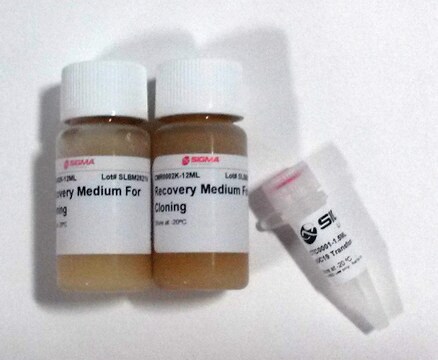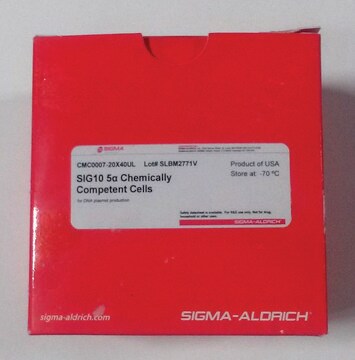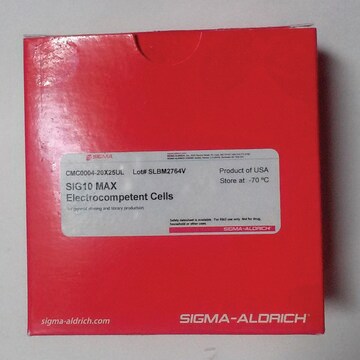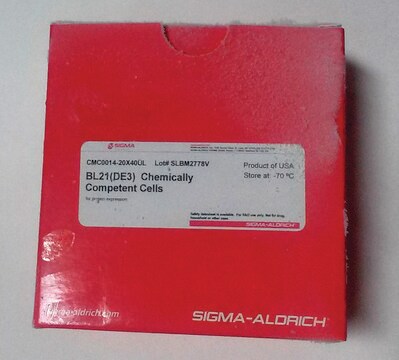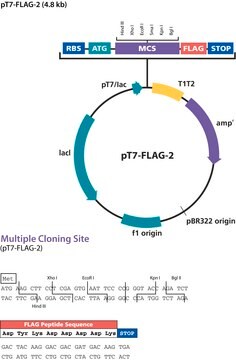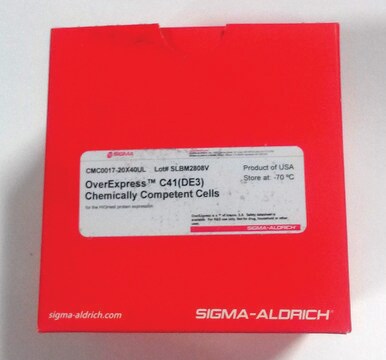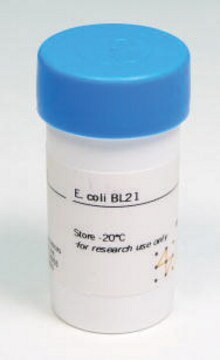CMC0001
SIG10 Chemically Competent Cells
Escherichia coli, rod shaped
Synonym(s):
Chemically competent E. coli, Competent bacterial cells
About This Item
Recommended Products
product name
SIG10 Chemically Competent Cells, for protein expression and DNA plasmid production
biological source
Escherichia coli
grade
for molecular biology
form
buffered aqueous solution
growth mode
adherent or suspension
morphology
rod shaped
technique(s)
microbiological culture: suitable
cell transformation
competent cell type: chemically competent
transformation efficiency: ≥1 × 109 cfu/μg
shipped in
dry ice
storage temp.
−70°C
Related Categories
General description
These cells are ideal for cloning and propagation of plasmid, cosmid, or fosmid clones and are highly efficient for routine cloning applications.
They share the most useful genetic elements of standard cloning strains like DH5α™ DH10B, JM109, TOP10, etc. and directly replace them in cloning protocols.
They are are provided in 40 μL, 80 μL and 160 μL aliquots, each being sufficient for one, two and four transformations respectively.
The cells have a transformation efficiency of >1 x 109 cfu/μg
The 96-well format are provided in aliquots of 20 μL per well and have a transformation efficiency of >1 x 108 cfu/μg.
Genotype
F- mcrA Δ(mrr-hsdRMS-mcrBC) endA1 recA1 Φ80dlacZΔM15 ΔlacX74 araD139 Δ(ara,leu)7697 galU galK rpsL nupG λ- tonA
Application
Features and Benefits
- share the most useful genetic elements of standard cloning strains like DH5α™ DH10B, JM109, TOP10, etc. and directly replace them in cloning protocols.
- ensures recovery of stable and high quality plasmid DNA.
- high transformation efficiency
- provide the performance researchers need with ease of use.
- provide solutions for a wide range of applications at economical prices.
- Blue - white screening
Components
- SIG10 chemically competent cells
- pUC 19 transformation control DNA at 10 pg/μL
- recovery medium for cloning
Principle
This strain also carries the recA1 and endA1 mutations. The recA1 genotype provides minimized recombination and aids in plasmid stability while endA1 provides for high quality plasmid DNA preparation.
They are bacteriophage T1-resistant (tonA mutation) and also resistant to streptomycin by virtue of rpsL mutation.
Legal Information
related product
Storage Class Code
10 - Combustible liquids
Certificates of Analysis (COA)
Search for Certificates of Analysis (COA) by entering the products Lot/Batch Number. Lot and Batch Numbers can be found on a product’s label following the words ‘Lot’ or ‘Batch’.
Already Own This Product?
Find documentation for the products that you have recently purchased in the Document Library.
Articles
Colony PCR reagents and our colony PCR protocol using REDExtract-N-Amp™ PCR ReadyMix™ and JumpStart™ REDTaq® PCR ReadyMix™ reagents.
Bacterial transformation is a process of horizontal gene transfer by which some bacteria take up foreign genetic material (naked DNA) from the environment. Bacteria that can take up free, extracellular genetic material are known as competent cells.
Protocols
For best results, ligation reactions must be heat inactivated at 70º C for 15 minutes before transformation. Alternately, the reactions may be purified.
Our team of scientists has experience in all areas of research including Life Science, Material Science, Chemical Synthesis, Chromatography, Analytical and many others.
Contact Technical Service